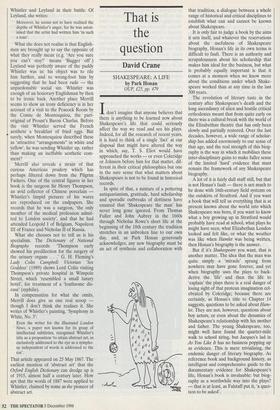That is the question
David Crane
SHAKESPEARE: A LIFE by Park Honan OUP, £25, pp. 479 Idon't imagine that anyone believes that there is anything to be learned now about Shakespeare's life that could seriously affect the way we read and see his plays. Indeed, for all the research of recent years, it is hard to think of a single 'fact' at our disposal that might have altered the way in which, say, T. S. Eliot would have approached the works — or even Coleridge or Johnson before him for that matter, dif- ferent in their critical philosophies but one in the sure sense that what matters about Shakespeare is not to be found in historical records.
In spite of that, a mixture of a pottering antiquarianism, gratitude, hard scholarship and sporadic outbreaks of dottiness have ensured that 'Shakespeare the man' has never long gone ignored. From Thomas Fuller and John Aubrey in the 1660s through Nicholas Rowe's short life at the beginning of the 18th century the tradition stretches in an unbroken line to our own day, and, as Park Honan generously acknowledges, any new biography must be an act of synthesis and collaboration with that tradition, a dialogue between a whole range of historical and critical disciplines to establish what can and cannot be known about Shakespeare.
It is only fair to judge a book by the aims it sets itself, and whatever the reservations about the usefulness of Shakespeare biography, Honan's life in its own terms is difficult to fault. There is an authority and scrupulousness about his scholarship that makes him ideal for the business, but what is probably equally important is that it comes at a moment when we know more about the conditions under which Shake- speare worked than at any time in the last 300 years.
The revolution of literary taste in the century after Shakespeare's death and the long ascendancy of alien and hostile critical orthodoxies meant that from quite early on there was a cultural break with the world of the Elizabethan theatre that has only been slowly and partially restored. Over the last decades, however, a wide range of scholar- ship has added enormously to our sense of that age, and the real strength of this biog- raphy is the way in which it mobilises these inter-disciplinary gains to make fuller sense of the limited 'hard' evidence that must remain the framework of any Shakespeare biography.
A lot of it is fairly dull stuff still, but that is not Honan's fault — there is not much to be done with 16th-century field systems on the outskirts of Stratford. And if you want a book that will tell us everything that is at present known about the world into which Shakespeare was born, if you want to know what a boy growing up in Stratford would probably have read at school, what plays he might have seen, what Elizabethan London looked and felt like, or what the weather was like when Hamlet was being written, then Honan's biography is the answer.
But if it's Shakespeare you want, that is another matter. The idea that the man was quite simply a 'miracle' sprung from nowhere may have gone forever, and yet when biography uses the plays to back- derive the 'life' and then the life to `explain' the plays there is a real danger of losing sight of that protean imagination cel- ebrated by Coleridge; because there are certainly, as Honan's title to Chapter 14 suggests, questions to be asked about Ham- let. They are not, however, questions about boy actors, or even about the dynamics of Shakespeare's relationship with his mother and father. The young Shakespeare, too, might well have found the quarter-mile walk to school tiring, but Jacques's lad in As You Like It has no business popping up as evidence. This is mere trivialising, the endemic danger of literary biography. As reference book and background history, as intelligent and comprehensive guide to the documentary evidence for Shakespeare's life, Honan's book is invaluable: but biog- raphy as a worthwhile way into the plays? — that is at least, as Falstaff put it, 'a ques- tion to be asked'.


















































































 Previous page
Previous page